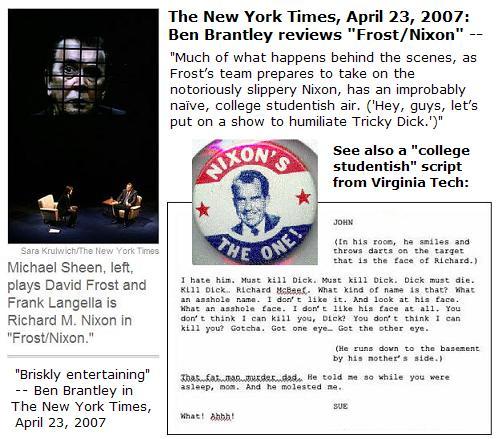In memory of Jack T. Chick, 1924-2016.
Related material —
See also Log24 on the date of Chick's death.
In memory of Jack T. Chick, 1924-2016.
Related material —
See also Log24 on the date of Chick's death.
Nian Hu in The Harvard Crimson this morning, Oct. 16:
"Hey Harvard, it’s Friday and it’s the weekend again–
though sadly, not another three-day one. On this day
in 1844, Friedrich Nietzsche was born. Remember
his wise words 'That which does not kill us, makes us
stronger' when prepping for midterms this weekend."
A fact check shows that Nietzsche was born yesterday .
A source check shows that the Nietzsche quote is from a book
with alternative title "How to Philosophize with a Hammer."
Click on the image below for related materal.
… But not for lack of trying. Click the image for details of the inset.
"Passion simmers,
Then it boils.
To the victor
Go the spoils."
— The Spoils of Babylon
(theme song, adapted)
Compare and contrast:
"… my song sounded
In the four-towered Caer, forever turning,
And of its Cauldron was my first song sung:
Nine maidens kindle the Cauldron by their breathing.
Of what nature is the Lord of Annwn’s Cauldron?
Enameled iridescence and pearly white its rim.
It will not boil the coward’s portion – not so its destiny."
— The Spoils of Hell
(title adapted)
"… the human will cannot be simultaneously
triumphant and imaginary."
— Ross Douthat, Defender of the Faith,
in this afternoon's New York Times at 3:25* PM ET
Some— even some Catholics— might say the will
cannot be triumphant unless imaginary.
Related material: The Galois Quaternion: A Story.
See also C. S. Lewis on enchantment.
* Cf., in this journal, the most recent 3/25 ,
and a bareword —
Click image for some context.
Ben Brantley in this morning's New York Times:
"Television mows down a titan in 'Frost/Nixon,' the briskly entertaining new play by Peter Morgan* about the 1977 face-off between its title characters, the British talk show host (as in David) and the former American president (as in Richard M.)….
Structured as a prize fight between two starkly ambitious men in professional crisis, 'Frost/Nixon' makes it clear that the competitor who controls the camera reaps the spoils."

Another application of this
"control the camera" philosophy:
the multimedia manifesto of
the Virginia Tech author of
"Richard McBeef"
Powered by WordPress